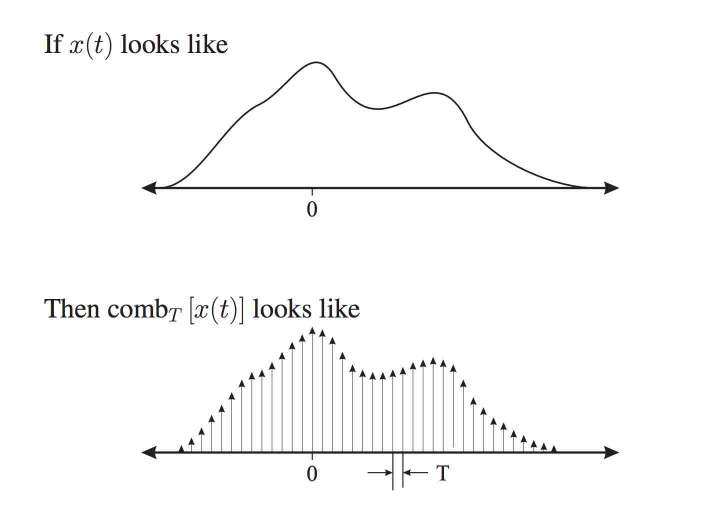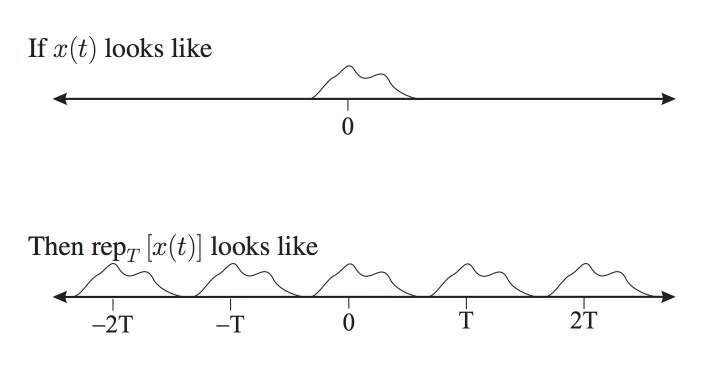Topic 3:Fourier transform of "rep" and "comb"
A slecture by ECE student Youqin Liu
Partly based on the ECE438 Fall 2014 lecture material of Prof. Mireille Boutin.
ECE438 SELECTURE
1.INTRODUCTION:
The topic 3 is the Fourier Transform of the Comb and Rep function. In my selecture, I am going to introduce the definition, the Fourier Transformation and the relationship of Comb function and Rep function.
2.THEORY:
(1)
Reference:https://engineering.purdue.edu/~bouman/ece637/notes/pdf/RepComb.pdf
According to the definition of the comb function:
$ comb_T\big(X(t)\big)= x(t)\cdot\ P_T(t) $
where $ P_T(t)= \sum_{n=-\infty}^\infty \delta(t-nT) $
Do the Fourier Transform to the function:
$ F\bigg(comb_T\big(x(t)\big)\bigg) = F\big(x(t)\cdot P_T(t)\big) $
According to the property of Fourier Transformation, the multiplication in the time domain is equal to the convolution in the frequency domain.
$ F\bigg(comb_T\big(x(t)\big)\bigg) = F\big(x(t)\big)* F\big(P_T(t)\big) $
$ =x(f)*F\big(P_T(t)\big) $
Because $ P_T(t)= \sum_{n=-\infty}^\infty \delta(t-nT) $ is a periodic function , so we can expand it to Fourier series.
$ P_T(t)=\sum_{n=-\infty}^\infty F_n e^{jn\cdot 2\pi t/T} $
$ \Rightarrow F_n = \frac{1}{T}\int\limits_{-T/2}^{T/2}P_T(t)e^{jn\cdot 2\pi t/T}dt $
$ =\frac{1}{T} $
So, $ P_T(t) = \frac{1}{T}\sum_{n=-\infty}^\infty F_n e^{jn\cdot 2\pi t/T} $
$ =\sum_{n=-\infty}^\infty \frac{1}{T} F(e^{jn\cdot 2\pi t/T}) $
$ =\sum_{n=-\infty}^\infty \frac{1}{T} \delta(f-\frac{n}{T}) $
$ = \frac{1}{T}P_{1/T}(f) $
So, $ F\bigg(comb_T\big(x(t)\big)\bigg)=X(f)*\frac{1}{T}P_{1/T}(f) $
$ =\frac{1}{T}X(f)*P_{1/T}(f) $ $ =\frac{1}{T}rep_{1/T}X(f) $
(2)
Reference:https://engineering.purdue.edu/~bouman/ece637/notes/pdf/RepComb.pdf
According to the definition of Rep function:
$ rep_T\big(x(t)\big):= x(t)*P_T(t) $
$ =x(t)*\sum_{n=-\infty}^\infty \delta(t-nT) $
So, $ F\bigg(rep_T\big(x(t)\big)\bigg)=F\bigg(x(t)*\sum_{n=-\infty}^\infty \delta(t-nT)\bigg) $
Use the impluse-train we get previously, according to the conclusion we get from Fourier Transformation of it, we know:
$ F\big(P_T(t)\big)=\frac{1}{T}P_{1/T}(f) $
So, $ F\bigg(rep_T\big(x(t)\big)\bigg)=x(f)\cdot\frac{1}{T}P_{1/T}(f) $
$ =\frac{1}{T}x(f)\cdot P_{1/T}(f) $
(create a question page and put a link below)
Questions and comments
If you have any questions, comments, etc. please post them on this page.



